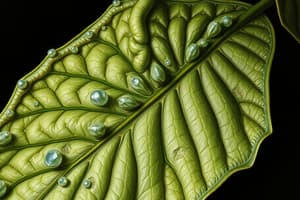Podcast
Questions and Answers
Define meristematic tissues and explain their characteristics.
Define meristematic tissues and explain their characteristics.
Meristematic tissues are composed of embryonic, undifferentiated cells capable of active cell division. They have no intercellular space, thin walls, and dense cytoplasm. Cell division occurs when the plant is in the embryonic stage, and it becomes restricted as the cells grow and specialize.
What are the two major categories of tissues in plants?
What are the two major categories of tissues in plants?
The two major categories of tissues in plants are meristematic tissues and permanent tissues.
Explain the characteristics of permanent tissues.
Explain the characteristics of permanent tissues.
Permanent tissues are composed of more mature, differentiated cells. They have intercellular space, thicker walls, and less dense cytoplasm. These tissues are responsible for the overall structure and function of the plant.
What is the function of apical meristems?
What is the function of apical meristems?
What happens to cell division as the cells in meristematic tissues grow and specialize?
What happens to cell division as the cells in meristematic tissues grow and specialize?
Flashcards are hidden until you start studying
Study Notes
Meristematic Tissues
- Meristematic tissues are responsible for plant growth.
- They are composed of undifferentiated cells that can divide repeatedly.
- Their cells have a large nucleus and dense cytoplasm, with thin cell walls.
- They lack vacuoles, which are storage compartments in cells.
- Meristematic tissues are found in specific locations in plants, such as the tips of roots and shoots.
Plant Tissues
- The two major categories of plant tissues are meristematic and permanent tissues.
- Meristematic tissues are responsible for growth, while permanent tissues perform specialized functions in the plant.
Permanent Tissues
- Permanent tissues are derived from meristematic tissues and have lost the ability to divide.
- They have specialized structures and functions, like conducting water and nutrients.
- They are categorized into simple and complex tissues.
- Simple tissues are composed of similar cells, while complex tissues are made up of different cell types.
Apical Meristems
- Apical meristems are located at the tips of roots and shoots.
- They are responsible for increasing the length of the plant.
- They produce new cells that differentiate into various tissues.
Cell Division in Meristematic Tissues
- As cells in meristematic tissues grow and specialize, cell division slows down.
- The cells become larger and develop distinct structures.
- This process leads to the formation of permanent tissues that perform specific functions in the plant.
Studying That Suits You
Use AI to generate personalized quizzes and flashcards to suit your learning preferences.




